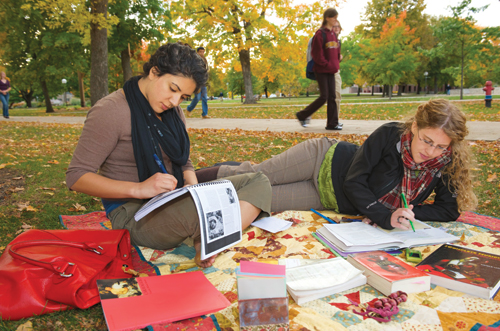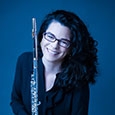
In November 2009, near the closing stages of the longest and worst economic recession since the Depression, Leone Buyse, flute professor at Rice, handed me a gray piece of paper. On this paper was an announcement for the only tenure-track, college flute job I would see that year. Despite the grim economic outlook, I won that job, and am now the Assistant Professor of Flute and Theory at St. Olaf College in Northfield, Minnesota. Preparing for a college teaching job audition involves not only being in top performance shape, like any other audition, but applicants also should be articulate in response to interview questions, show intelligence, and be enthusiastic throughout the process.
The Application
The St. Olaf job announcement was typical of many full-time college music teaching positions. A completed application included a cover letter, curriculum vitae, CD, transcripts, references, and letters of recommendation. This particular job also required a written response to the St. Olaf Mission Statement. Culminating the entire process was a playing audition, teaching demonstrations in the areas of flute and theory, and several interviews.
Cover Letter
The cover letter is a chance to express, in one to two pages, how your professional experience aligns with the school’s specific requirements. This letter is the first thing a search committee may read. Give specific examples of how your experience directly fulfills their job description.
Curriculum Vitae
The CV is an organized list of professional and educational experiences. It is usually most effective to organize each section in reverse chronological order with the most recent events first. The CV is expected to be more detailed than a résumé and can normally run between eight and twelve pages in length for those prepared to teach at the university level. Adding brief descriptions to activities that may be unfamiliar to a search committee would be useful in helping them make more informed decisions.
CD
The CD should represent your very best playing, breadth of performing experience, and facility with a wide range of repertoire. Include a musically varied mix of solo, chamber, new, and orchestral music. Make sure that you include selections that you enjoy hearing. Your listeners will probably enjoy them as well.
Transcripts and References
Young musicians should start a file with unofficial copies of their transcripts. This makes assembling a job application on short notice much easier. If official transcripts are required and the deadline is close, it is reasonable to send the unofficial copies, with the intention of sending the official transcripts once they are processed. A list of references should include names, titles, addresses, emails, and phone numbers of those who will write recommendations
for you.
Be wise when selecting recommenders. Choose people who actually know you and your work. If they also have a connection to the college to which you are applying, they will be able to offer more insight in their letters about how you might complement the talents of the current faculty.
Response to Mission Statement
While not all college jobs ask for this, it is wise to do as much research as possible about the school. Investigate their website, their library holdings, and their mission if they have one. While the search committee provided an abbreviated, half-page version of the St. Olaf Mission Statement, I searched the school’s website and read an extended version, that was several pages long. It gave me a more complete sense of the school’s focus and helped me respond with both a professional and personal point of view. For example, since St. Olaf College has a religious affiliation, I included content about my own spiritual perspective. Do not take short cuts with your research.
Audition
For some college jobs, the audition portion can involve up to three rounds of performances with all candidates present. In this case, only the top three finalists were invited to St. Olaf to play a twenty to thirty minute recital. I performed two solo works (one Baroque and one modern), a movement from a 20th century sonata (that the faculty pianist already knew), and a virtuosic chamber piece with woodwind faculty members.
A few weeks before my audition, I assembled and rehearsed the chamber work and sonata with my graduate school colleagues at Rice University. I also arranged a chamber coaching with my teacher Leone Buyse, and performed my solo works for non-flute students who passed by my practice room. I suggest choosing repertoire that is already exceptionally well-prepared. You want to feel powerful and ready to take risks if the music calls for them. The audition is where you can make the biggest and most immediate impact on listeners; share your absolute best.
Teaching
A college job audition naturally puts the emphasis on teaching skills. In my experience, I have only been asked to demonstrate teaching in final rounds. To get to that point, however, the cover letter, CV, and other supporting materials (like a list of student accomplishments) should clearly demonstrate your level of teaching ability.
While I do not have a teaching degree, I had, at the time I applied, eighteen years of relevant teaching experience that included college and university settings, an Italian conservatory, a middle school band program, after school music programs, an outreach program for at-risk youth, and my own private studio. The diversity of my experience directly satisfied one of the requirements listed on the job announcement.
Interview Preparation
There are typically two rounds of interviews: semifinal and final. Semifinal interviews can last up to 30 minutes and occur by phone. The search committee will ask questions through a speakerphone, and it is much easier to hear if you use a landline rather than a cell phone. The final interviews usually last a day or two and occur on campus with various faculty and college administrators.
At the time I applied for the St. Olaf job, I was in my last year of residency as a doctoral student at Rice University. I believe that the direct access to incredible teachers, mentors and musical colleagues was indispensable to my preparing an application that would eventually stand out.
My preparation for the interviews started by simply reviewing notes from previous job interviews and from mock interviews I had done at Rice. Then, to see how I would react under more pressure, I asked Larry Rachleff, Music Director of the Shepherd School Symphonies, to give me a mock interview. Putting myself in an interview situation was a tremendously valuable experience that vastly improved my overall presentation. When I asked Leone Buyse for advice, she gave me some important questions to think about, as well as timely encouragement. I also spoke with a friend, Jennifer Grim, who had recently won the flute professorship at UNLV. She offered additional thought-provoking questions that I had not considered before. Violinist Creston Herron discussed his experience working with university administrators. The point is, when in doubt, ask around for advice as you will be surprised at the insights you will learn.
It is important to know who is on your committee. Again, do your research and look up names and bios. As you prepare for the interviews, picture yourself on their side of the table, and think up questions you would have for a potential new faculty member. Practice speaking your replies in the car, shower, or wherever you happen to get inspired. Record yourself speaking with a confident tone and a sincere voice. Listen back. Listen for the ums and uhs and re-record. Be who you are without hiding, apologizing, or forcing yourself too much in any way. Look at this as a great opportunity.
Audition Day
In the final round expect a long day; stamina is key to success. For example, my audition day started at 8:00 a.m. and went straight through to 10:00 p.m. Immediately after the recital portion of the audition, I taught two lessons in a masterclass setting. Then after a short break, I taught a sixty-minute theory class.
For the lesson demonstrations, I was given in advance the titles of the works that two sophomore flutists would be playing. I prepared by refreshing my knowledge of the works, including their historical backgrounds and composers. I played through the pieces and listened to a few recordings. It is important to be positive and encouraging, but not superfluous in praise. Be honest about your impressions of a student’s performance, but focus on one or two issues that can be remedied within the time allotted. What is most important is that you help the student achieve an audible and meaningful improvement in the time you have.
For the theory demonstration, I was to prepare a chapter about the submediant (vi) chord from the students’ textbook. The search committee provided a copy of the chapter and a description of topics covered in this freshman theory and aural skills course. While I was already teaching an aural skills course at Rice, I sought additional advice from Karim Al-Zand, one of my theory professors, on how to structure the class. Once I had an outline ready, I asked some student colleagues for their critiques. What I ended up presenting at St. Olaf intermingled lecturing with various activities in which students practiced singing, identifying, and taking dictations of submediant chords in three overarching contexts.
In addition to teaching and performing, I had three informal mealtime discussions with faculty and staff, and seven official interviews and meetings with faculty, students, and administrators. I recommend taking a small notebook with you, and, whenever you can (i.e. during a bathroom break), jot down the names of the people you have met and something about them to help you remember them.
Be sure to get enough rest the night before. Do not waste time worrying. Study and prepare your replies to questions they might ask, but above all trust that you have prepared as well as you could and that you have made it this far for a reason. Be yourself. Ask the interviewers about themselves; they may very well be your future colleagues. In fact, believe that this job is yours. Believe that everyone is there to support you and get to know your many strengths.
If there are professional connections between the committee and people you have worked with before, highlight them. Share your experiences doing outreach or commissioning work, or anything that you think is special about your background that would be of interest to the committee. Also be able to describe situations that show how you are a supportive colleague.
Other than that, enjoy the process as much as you can. It is actually quite fun meeting so many people in such close succession. Play your heart out, enjoy the teaching, interesting conversation, and exchange of ideas.
* * *
Typical Questions for a Phone Interview
Why do you want this job?
What was a recent inspiring performance experience?
Describe a challenge in teaching and how you overcame it.
How have your mentors influenced your teaching?
What role does music play in the liberal arts?
How would you teach certain musical skills?
Tell us about your experience working on a team.
How do you teach certain music theory concepts?
What would you expect a student to know after completing their theory courses?
Tell us about your other interests outside of music.
How does your experience support the mission statement of the college?
Typical Questions for an On-Campus Interview
What is your teaching philosophy?
What specific methods/materials/
etudes do you use?
What are the differences in the repertoire you would assign a music major vs. a non-music major?
How would you go about recruiting? (Count on this one to be asked.)
How will you balance teaching and performing?
Why do you want this job, and why would you like to live here?
What did you not get in your training that you wish you had?
What other kinds of classes would you be interested in teaching if given the chance?
What repertoire would be included on a typical senior recital program? Why?






